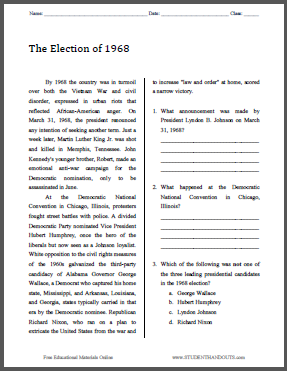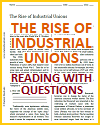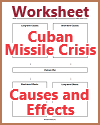 By 1968 the country was in turmoil over both the Vietnam War and civil disorder, expressed in urban riots that reflected African-American anger. On March 31, 1968, the president renounced any intention of seeking another term. Just a week later, Martin Luther King Jr. was shot and killed in Memphis, Tennessee. John Kennedy's younger brother, Robert, made an emotional anti-war campaign for the Democratic nomination, only to be assassinated in June.
By 1968 the country was in turmoil over both the Vietnam War and civil disorder, expressed in urban riots that reflected African-American anger. On March 31, 1968, the president renounced any intention of seeking another term. Just a week later, Martin Luther King Jr. was shot and killed in Memphis, Tennessee. John Kennedy's younger brother, Robert, made an emotional anti-war campaign for the Democratic nomination, only to be assassinated in June.
At the Democratic National Convention in Chicago, Illinois, protesters fought street battles with police. A divided Democratic Party nominated Vice President Hubert Humphrey, once the hero of the liberals but now seen as a Johnson loyalist. White opposition to the civil rights measures of the 1960s galvanized the third-party candidacy of Alabama Governor George Wallace, a Democrat who captured his home state, Mississippi, and Arkansas, Louisiana, and Georgia, states typically carried in that era by the Democratic nominee. Republican Richard Nixon, who ran on a plan to extricate the United States from the war and to increase "law and order" at home, scored a narrow victory.
Answer Key: (1) He had no intention of seeking another term. (2) Protesters fought street battles with police. (3) C - Lyndon Johnson.
Click here to print.
|
 By 1968 the country was in turmoil over both the Vietnam War and civil disorder, expressed in urban riots that reflected African-American anger. On March 31, 1968, the president renounced any intention of seeking another term. Just a week later, Martin Luther King Jr. was shot and killed in Memphis, Tennessee. John Kennedy's younger brother, Robert, made an emotional anti-war campaign for the Democratic nomination, only to be assassinated in June.
By 1968 the country was in turmoil over both the Vietnam War and civil disorder, expressed in urban riots that reflected African-American anger. On March 31, 1968, the president renounced any intention of seeking another term. Just a week later, Martin Luther King Jr. was shot and killed in Memphis, Tennessee. John Kennedy's younger brother, Robert, made an emotional anti-war campaign for the Democratic nomination, only to be assassinated in June.













